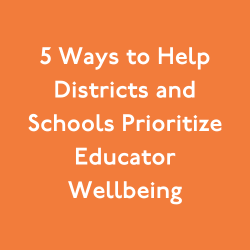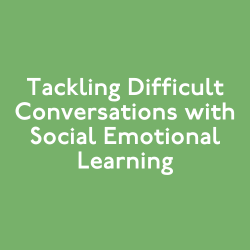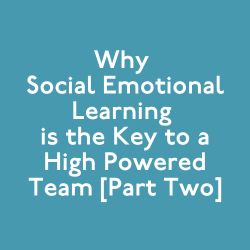We’ve all been on a bad team.
A team where mistakes are laughed at or shrugged off. “Not my problem.”
A team where dropping the ball is no big deal. Where mailing it in becomes normal and every student gets a B+ rather than helpful critiques of their work. Where isolation creeps in, making the classroom feel like an island on which you are the prey.
It’s not fun to come into work feeling like people don’t have your back, that success is out of reach and likely won’t be celebrated, or to be disconnected from your leaders and the direction they seem to be headed. Most educators have found themselves in one, or perhaps all, of those situations at some point or another.
It’s much rarer to find a good team — likely because people don’t leave them. It’s hard to understate the value of a strong team or to overstate how difficult it can be to build one.
When we think about building teams, often times we think about the skills needed to complete the job. Naturally, that’s important. A former accountant with a math degree may not be as prepared to teach US History as someone who studied the Civil War and enjoys participating in the occasional reenactment. While training and skills are important, it is the emotional balance of a team that often plays a more valuable role.
Let’s say the new math teacher did have to cover history. A good team can help overcome situations like that, at least for a short time, by leveraging their collective experience and support network to cover knowledge gaps or emotional reactions. On a bad team, where the turnover rate is high and everyone’s just trying to get by, why would someone bother helping?
Ultimately, good teams start with good leadership. Leaders who know when to provide support, when to allow autonomy, and how to hold and be held accountable form the foundation for strong teamwork. Almost all of that relates to their ability to manage their own emotions and the emotions of their team.
Social emotional learning (SEL) is the process through which children and adults understand and manage emotions, set and achieve positive goals, feel and show empathy for others, establish and maintain positive relationships, and make responsible decisions (Collaborative for Academic, Social, and Emotional Learning [CASEL], n.d.).
Often times, we hear SEL discussed in relationship to student development. The Aspen Institute National Commission on Social, Emotional, and Academic Development recently released recommendations to incorporate SEL education based on traits necessary for students to succeed in the workplace and in relationships that go well beyond grades or scores, such as listening, collaboration, and perseverance (“From a Nation at Risk to a Nation at Hope”, 2019).
The same is true for educators to be successful in the classroom. If we expect our school teams to be impactful and work well together, providing opportunities for adult SEL is important.
Adult SEL is a proactive approach to mitigating conflict, burnout, and mental health issues. Practicing emotional skills within our teams also improves situations when reactive measures are necessary after a conflict occurs. When we see the humanity in each other on a regular basis, it makes resolutions easier to find.
Actively processing how we’re feeling and situations we’re working through with our teams can also alleviate secondary traumatic stress (STS), something teachers experience on a regular basis. According to the National Center on Safe Supportive Learning Environments:
STS is the emotional distress that results when an individual hears about the traumatic experiences of another individual. Distress may result from hearing someone’s trauma stories, seeing high levels of distress in the aftermath of a traumatic event, needing to retell a student’s story, and/or seeing photos or images related to the trauma. Individuals with symptoms severe enough could be diagnosed with post-traumatic stress disorder (PTSD) (National Center on Safe Supportive Learning Environments, n.d., pg. 1).
Adult SEL gives teachers the time and space to acknowledge the challenges and stress each of them carry on a daily basis and then build the skills to adequately and meaningfully support one another. It will help to build understanding amongst team members. A lack of understanding will likely translate to miscommunications, the root of so many conflicts. After all, you might not have been so short to your colleague if you knew what stress they were carrying.
In part two, we’ll share actionable steps school leaders can take to integrate social emotional learning within staff meetings to develop more effective teams.
Sign up for Move This World’s newsletter to stay up to date on social emotional learning.
Enter your email below










